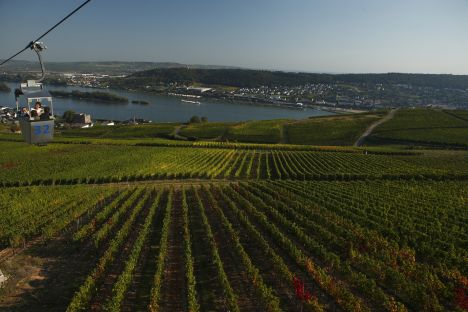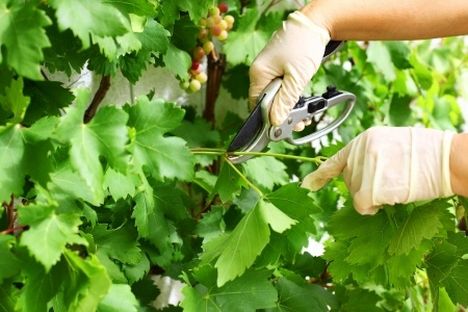The events at the Schloss Schönborn domain wine estate in Hattenheim (Rheingau) will continue to occupy the Wiesbaden public prosecutor's office in the coming months. In October 2012, investigators had searched the Rheingau estate of Paul Graf von Schönborn as well as his estate in Hallburg (Franconia) because of violations of the wine law. On 28 August 2013, Count Schönborn declared in a press conference that after having seen the audit report of the wine control, he voluntarily renounced the AP numbers of 22 wines from the Rheingau domain and three from his Franconian estate. Thus, it became quiet about the spectacular case, which was also reported by national media. But on request of Wein-Plus, Hartmut Ferse, spokesman of the Wiesbaden public prosecutor's office in charge, now explained: "We have gained new insights. When the proceedings will be concluded is "completely open according to the current state of affairs". He could not give further details because of the ongoing proceedings. He only confirmed that the former Rheingau plant manager was "so far the only accused".

|
| Although the final report of the wine inspection has been available since the end of August%, the state prosecution continues to investigate. (Symbol photo: Wein-Plus) |
At the press conference at Hallburg Castle, Paul Graf Schönborn made public some of the findings of the wine inspection - and they are considerable: two Franconian Müller-Thurgau wines had been inadmissibly blended, as had a third wine, a special bottling for a customer. In addition, there are the much more serious offences from the Rheingau: The blending of Rheingau wines with wine from another growing region, the impermissible addition of wine distillate to increase the alcohol of Trockenbeerenauslesen, the blending of single vineyards with wines from other Rheingau vineyards, impermissible must concentration in a QbA wine from the Hochheimer Domdechaney as well as the impermissible reduction of the sulphur content of a basic sparkling wine. Some of the wines concerned bear labels with the very best sites of the Rheingau, such as the Erbacher Marcobrunn, the Rüdesheimer Berg Schlossberg or the Hochheimer Hölle. Two Erste Gewächse wines have also been blended with other Rheingau sites.
According to the findings of the wine inspectors, Rheingau red wines from the estate have been blended with red wine from another growing region. This has already happened with a wine from the 2008 vintage. The estate manager of the Franconian winery, Georg Hünnerkopf, also admitted this. He had supplied the rosé and red wines, which were sold with a Rheingau label in Hattenheim. Bavarian wine inspectors stumbled upon it by chance: during inspections at the Rheingau domain winery, they had discovered 1,000 litres of wine from Franconia that had arrived there without the necessary accompanying documents. Hünnerkopf has asked the count to apologise for this; he remains estate manager at Schloss Hallburg. "That was real nonsense on my part, I should never have got involved," he told journalists at the press conference.

|
| Wines from Rüdesheim vineyards are also said to have been manipulated. (Photo: DWI) |
The Rheingau estate manager, who was apparently responsible for the offences and who was awarded "Estate Manager of the Year" by Gault Millau in 2009 for his work at Schönborn, terminated his employment contract by mutual agreement with Paul Graf von Schönborn as late as at the end of October 2012. This was confirmed by the lawyer of the former estate manager, the renowned wine lawyer Dr. Hans Eichele from Mainz. Shortly after, it became known that the ex-estate manager is now working as a cellar master at the Palatinate VDP Fitz-Ritter wine estate.
The VDP took its time to comment on the investigations. As late as in August 2013, president Steffen Christmann declared that the membership of the Schönborn domains would be suspended until the proceedings had been concluded. Paul Graf von Schönborn had requested this from the VDP before he made the return of the 25 AP numbers public in a press conference. "This case is anything but a trivial matter for us, and we will do everything we can to prevent damage to the association and to German wine culture," Christmann said. When asked by Wein-Plus, VDP managing director Eva Raps explained: "A wine law conviction is a clear reason for exclusion for us". According to the statutes, sanctions up to and including exclusion can only be decided after a legally binding conviction for a significant violation of wine law regulations. Here it depends on the reasons for the judgement: "The manager is not the owner, and the manager no longer works for the winery". However, the VDP knows the weak points of the winery - and there is a lot wrong with it.
This is nothing new for connoisseurs of Rheingau estates. For a long time, Schönborn's plots in the renowned Rheingau vineyards have been considered poorly tended. "Often not even the most necessary things were done there, you could see that from a distance," says a Rheingau winegrower who wishes to remain anonymous. At his press conference in August, Paul Graf von Schönborn announced the "reorientation of the winery". The young Steffen Röll, unburdened by the events, took over the vacant position as operations manager and produced the 2012 vintage. New employees for the outside operation are also said to have been hired.

|
| Vineyard care is crucial for wine quality. (Photo: Wein-Plus) |
But what the investigations of the Wiesbaden public prosecutor's office will reveal is currently completely open. Even Paul Graf von Schönborn, who is listed as a witness in the proceedings and calls the ex-estate manager the sole culprit, is now being represented by a lawyer. He had apparently - like most observers - expected the investigations to end in autumn: "Before the end of the investigation" he had returned the AP numbers, he wrote in a press release around the end of August. That is not what happened. It was also reported several times in the past months that the former plant manager had admitted to some of the accusations. His lawyer, Dr. Hans Eichele, does not want to comment on this at the request of Wein-Plus. For the former farm manager, the matter could become expensive. It is true that the penalties for violations of the wine law are moderate: In cases where there was no threat to human health, the maximum penalty is three years in prison - and the courts very rarely impose that. If convicted, the former administrator is more likely to face a short suspended sentence or a fine. But a claim for damages by Count Schönborn could cost him much more because of the loss of turnover and the damage to the reputation of the estate. Eichele's strategy for defending his client is therefore clear - the former farm manager is not the only one responsible. "Contrary to what has been presented so far by the house of Count Schönborn, the directives for the manipulations of the management are said to have been known or at least tolerated", writes the magazine Weinwirtschaft about Eichele's argumentation. According to this, the cases are said to go back to 2005. That means a lot of work for the investigators. So it will take a long time until the events at the Schloss Schönborn domain wine estate in Hattenheim are cleared up.
The Schloss Schönborn wine estate in the wine guide
(wines from the estate were last tasted in 2011)